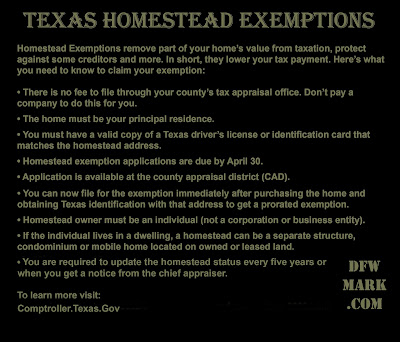There is no Texas state property tax. Property taxes are assessed and administered locally. Tax exemptions remove part of a taxable asset’s appraised value from taxation. This reduction saves money for the taxpayer.
For example, a $100 asset with a 10% tax exemption would be taxed as if it was only worth $90. If the tax on this item was 2.5%, the tax would move from $2.50 to $2.25. Those quarters add up quickly for real estate.
Real estate has a variety of tax exemptions available depending on the property use and condition of the property owners being taxed. Exemptions differ by state. In Texas, exemptions also differ according to the taxing authority such as counties, municipalities, schools and special districts.
A common property exemption in Texas is the Homestead Exemption (HS). Additional exemptions include Agricultural/Timber use, Solar and Wind-Powered Energy Device or Charitable Organizations and Businesses. Each taxpayer has different circumstances. Get advice from a tax attorney or Certified Public Accountant for your specific needs. Apply for most exemptions through your county Central Appraisal District (CAD) by April 30..
Please follow the link for additional information and guidelines.
Homestead Exemption Information
Agricultural/Timber Exemptions
Solar, Wind-Powered and Biomass Energy Devices
Charitable Organizations and Businesses
These are the Comptroller links to DFW metro counties:
Collin, Dallas, Denton, Ellis, Fannin Johnson, Kaufman, Rockwall and Tarrant
These are the Central Appraisal Districts (CAD) for DFW metro counties
Collin, Dallas, Denton, Ellis, Fannin, Johnson, Kaufman, Rockwall, and Tarrant
Homestead Exemption Information Back to Top
Homestead Exemptions remove part of your home’s value from taxation, protect against some creditors and more. In short, they lower your property tax payment. The amounts vary by county. All Texas homesteads receive a mandatory $100,000 exemption on the home’s value from school property taxes (changed to reflect newest numbers). Other local entities, like cities and counties, offer a separate residence homestead exemption. A homestead exemption can typically save a homeowner 10% to 20% on their property taxes.
The 10% Cap is an annual tax limit on homestead properties. Taxing authorities are limited to a 10% increase of the appraised value of a residence homestead from one tax year to the next. If the appraised value is 50% higher than the previous year, this difference could increase by 10% yearly over five years (longer if the appraised value continues to increase) with a “gap year” for new homeowners.
Only homesteaded properties get this benefit. Income-generating properties with tenants and properties owned by businesses are not eligible.
Conditional exemptions are determined by the property owner not the land. The individual conditions will require documentation and may allow a partial percentage or total exemption. The conditional exemptions include Age 65 or Older, Disabled Person, 100% Residence Homestead Exemption for Disabled Veterans, Surviving Spouses of an Armed Services Member Killed in the Line of Duty, Surviving Spouse of a First Responder Killed in the Line of Duty, or Donated Residence of Partially Disabled Veteran (or surviving spouse).
Here’s what you need to know to claim your exemption:
• There is no fee to file through your county’s tax appraisal
office. Don’t pay a company to do this for you.
• The home must be your principal residence.
• You must have a valid copy of a Texas driver’s license or
identification card that matches the homestead address.
• Homestead exemption applications are due by April 30.
• Application for homestead exemption is available at the county
appraisal district (CAD).
• You can now file for the exemption immediately after purchasing
the home and obtaining Texas identification with that address to get a prorated
exemption.
• Homestead owner must be an individual (not a corporation or business
entity).
• If the individual lives in a dwelling, a homestead can be a
separate structure, condominium or mobile home located on owned or leased land.
• You only need to file once unless you move or get a notice from
the chief appraiser.
Additional information
Texas homeowners who qualify for a homestead exemption can file for the exemption immediately after
purchasing the home and obtaining Texas identification with that address to get
a prorated exemption. However, the cap doesn’t start until the homestead has
been in place for more than one year – a so-called “gap year.”
Texas homestead exemptions from counties, schools, cities, and special districts reduce the property taxes for the homeowner. The amounts vary from county to county. All Texas homesteads receive a $100,000 exemption (a change from $25K in 2022) on their home's value from school property taxes. Other local entities, like cities and counties, offer a separate residence homestead exemption. A homestead exemption can typically save a homeowner 10% to 20% on their property taxes.
Take Advantage of Homestead Exemptions from the Texas Comptroller
One of the easiest ways a homeowner can lower his or her property tax bill is to file a
homestead exemption. A homestead is generally the house and land used as the
owner’s principal residence on Jan. 1 of the tax year.
Homestead exemptions reduce the appraised value of your home and, as a result,
lower your property taxes. To apply for an exemption on your residence homestead,
contact the (NAME) Appraisal District.
Available homestead exemptions include:
• School taxes: All homeowners may receive a $100,000 homestead exemption for
school taxes.
• County taxes: If a county collects a special tax for farm-to-market roads or flood
control, a homeowner may receive a $3,000 homestead exemption for this tax.
• Age and disability exemptions: Individuals 65 or older or disabled as defined
by law may qualify for a $10,000 homestead exemption for school taxes, in
addition to the $100,000 exemption available to all homeowners. Also, any taxing
unit may offer a local optional exemption of at least $3,000 for taxpayers age 65
or older and/or disabled. Older or disabled homeowners do not need to own their
homes on Jan. 1 to qualify for the $10,000 homestead exemption. They qualify
as soon as they turn age 65 or become disabled.
• Taxing units may offer a local option exemption based on a percentage of a
home's appraised value. Any taxing unit can exempt up to 20 percent of the
value of each qualified homestead. No matter what percentage of value the
taxing unit adopts, the dollar value of the exemption must be at least $5,000.
• Partial exemption for disabled veterans: Texas law provides partial
exemptions for any property owned by disabled veterans, surviving spouses and
surviving children of deceased disabled veterans. This includes homesteads
donated to disabled veterans by charitable organizations at no cost
or not more than 50 percent of the good faith estimate of the homestead’s
market value to the disabled veterans and their surviving spouses. The
percentage of service-connected disability determines the exemption amount.
• 100 Percent Residence Homestead Exemption for Disabled Veterans: A disabled veteran awarded 100 percent disability compensation due to a service-connected disability and a rating of 100 percent disabled or of individual unemployability from the United States Department of Veterans Affairs is entitled to an exemption from taxation of the total appraised value of the veteran's residence homestead. Surviving spouses of veterans who qualified for this exemption or who would have qualified for this exemption if it had been in effect at the time of the veteran’s death are also eligible with certain restrictions. The residence homestead application must be filed if this exemption is claimed.
• Surviving Spouses of Members of the U.S. Armed Services Killed in the Line of Duty: The surviving spouse of a member of the U.S. armed services who is killed or fatally injured in the line of duty is allowed a 100 percent property tax exemption on his or her residence homestead if the surviving spouse has not remarried since the death of the armed services member.
• Surviving Spouses of First Responders Killed in the Line of Duty: The eligible surviving spouse of a first responder killed in the line of duty is allowed a 100 percent property tax exemption on his or her residence homestead if the
surviving spouse has not remarried since the death of the first responder.
For more details on homestead exemptions, contact the Central Appraisal District (CAD) at the links below. The homestead exemption application is available online at:
comptroller.texas.gov/forms/50-114.pdf
You may file an exemption with your appraisal district for the homestead exemption up to two years after the taxes on the homestead are due. Once you receive the exemption, you do not need to reapply unless the chief appraiser sends you a new application. In that case, you must file the new application. If you should move or your qualification ends, you must inform the appraisal district in writing before the next May 1st. A list of appraisal district addresses and phone numbers is available online.
Agricultural/Timber Exemptions Back to Top
Agricultural/Timber Exemptions (guidelines and resources)
Application for 1-d-1 (Open Space) Agricultural Use Appraisal (auto download PDF)
Agricultural/Timber Exemption is a “special valuation.” It requires five or more years of agricultural production. The land is valued based on production rather than market value.
Each Texas county determines the minimum acreage for this exemption. Most counties require 10 acres. However, honeybees only require five acres minimum across all of Texas with a maximum of 20 acres dedicated to bee production. Bees can be leased but can cost more than hive ownership.
Technically called “Open Space” or colloquially “Ag exempt,” it requires some form of work, land preparation and stewardship. It removes a much larger appraisal valuation than a homestead exemption. It can be applied adjacent to a HS exemption for additional savings. Contact your county CAD for rates.
Solar, Wind-Powered and Biomass Energy Devices Back to Top
Solar, Wind-Powered and Biomass Energy Devices (auto download guidelines PDF booklet)
Form 50-123 for exemption (auto download PDF)
Solar, Wind-Powered and Biomass Energy Devices provide a significant property tax exemption (Texas Tax Code Sec. 11.27) for the value of solar-collection property within guidelines with on-site devices for electrical production or storage.
Residential property owners must own the property and energy system on January 1 of the taxable year. Leased systems do not qualify for an exemption. Property owners apply to their CAD with supporting documents to detail the installation date and total kilowatt output of the system.
Solar energy devices installed or constructed after 2013 and used for a commercial purpose are subject to the cost method of appraisal. The depreciated value must be calculated using a useful life of 10 years or less.
To claim this exemption, fill out Form 50-123, “Exemption Application for Solar or Wind-Powered Energy Devices” and contact the Texas Comptroller’s Office for guidelines.
Charitable Organizations and Businesses Back to Top
Charitable Organizations and Businesses
Form AP-199 (auto download PDF)
Charitable Organizations and Businesses engaged primarily in charitable activities may be eligible for local property tax exemptions. A corporation may be eligible for a local property tax exemption if it meets specific criteria including land title held by an IRS Section 501(c)(2) entity and releases all income, less expenses, to qualify as a charitable organization.
An organization must apply for a “Determination Letter for Property Tax Exemption” from the Texas Comptroller’s office and complete Form AP-199.
I've Got Your Six!
Mark M. Hancock, GRI, MRP, AHWD
REALTOR, New Build certified
214-862-7212
DFWmark.com




















